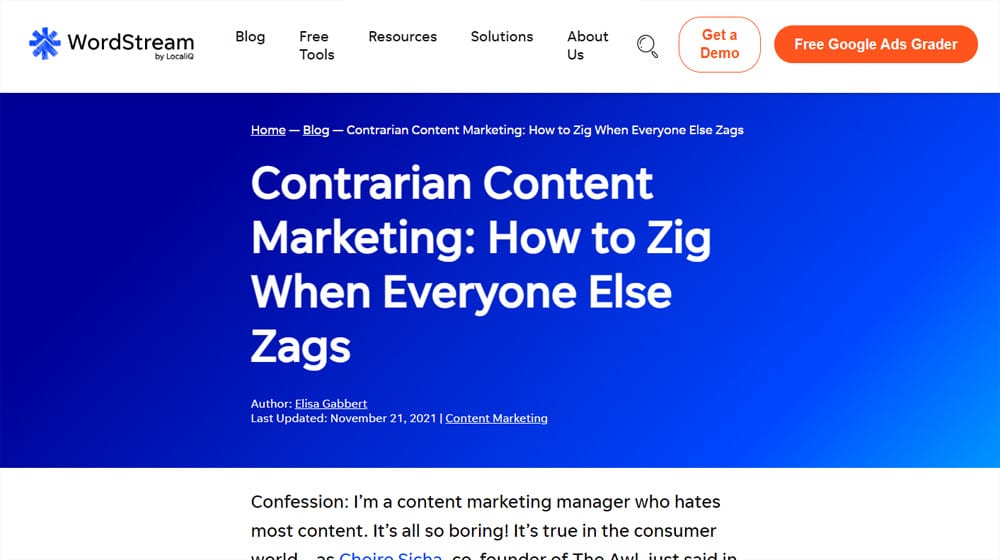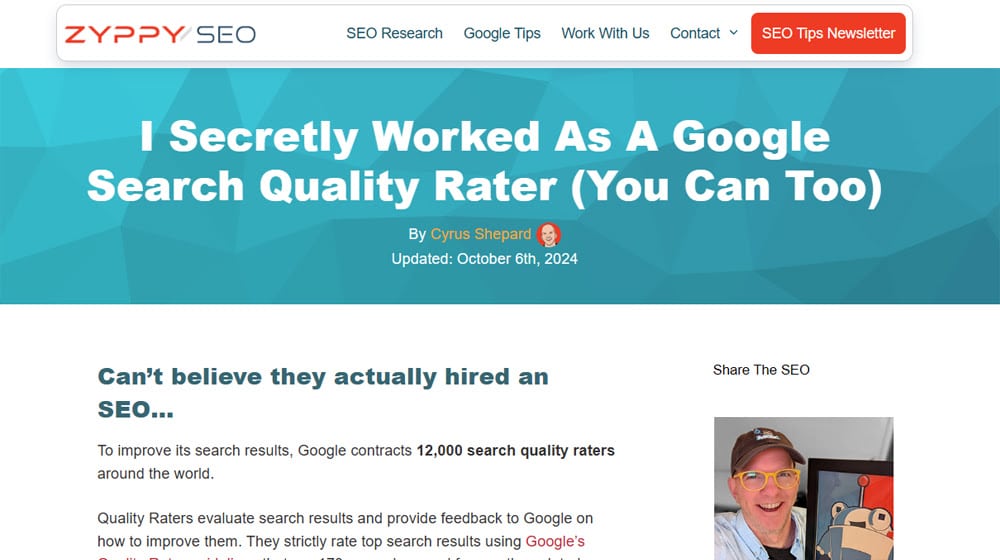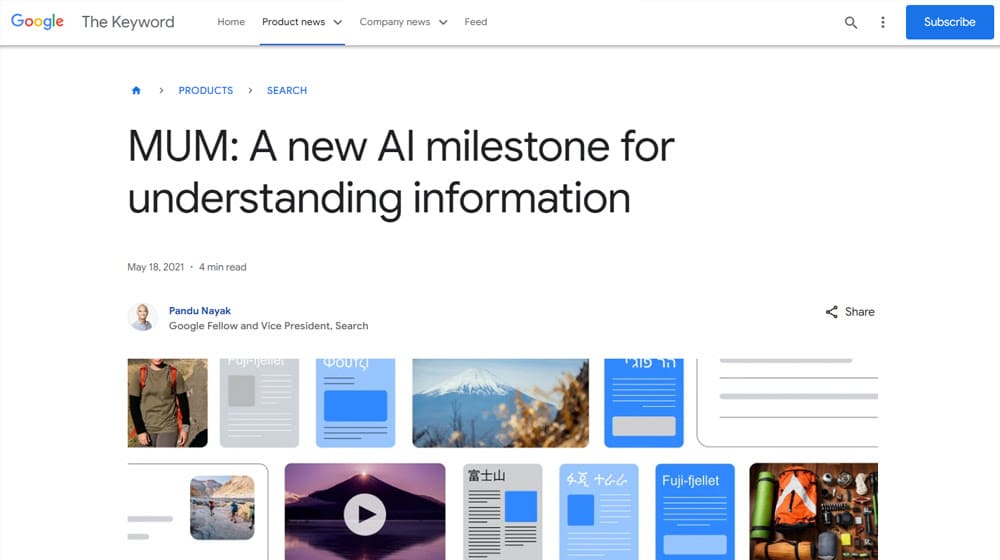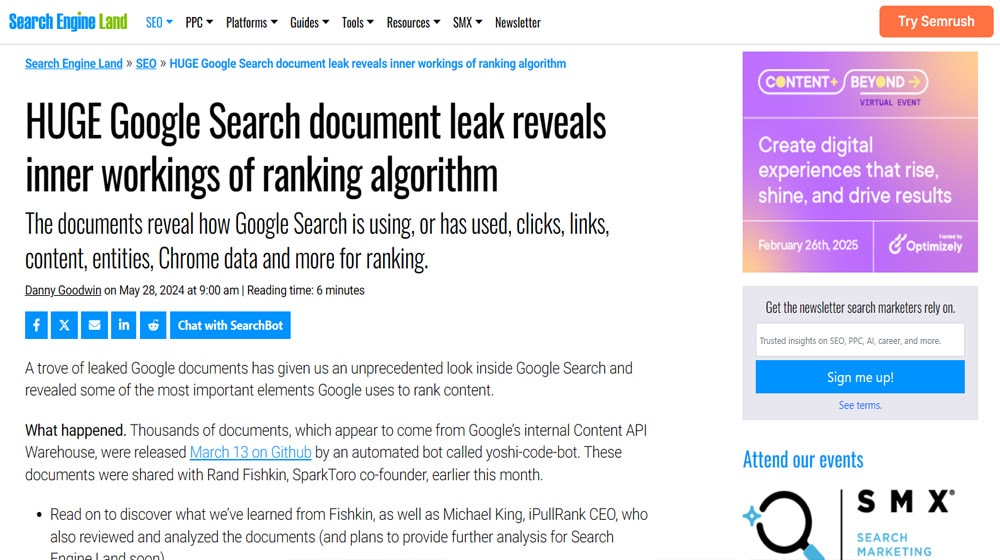Consensus and SEO: Does It Hurt to Be a Contrarian?

Here's an interesting question for you that I've been thinking about a lot in the last few months.
Should you agree with everyone else if you want to rank in Google's search results?
It's a surprisingly difficult question to answer. I've been building a picture of this concept of consensus in SEO, and I've come to a few conclusions, and I wanted to talk about them today.
I do want to put a disclaimer up front, though: I don't have the same unlimited Big Data access that massive companies like Ahrefs and Semrush has, and my studies are limited so far. It's entirely possible that my conclusions are wrong. My purpose for this post is to get people talking about the concept, see what other people think, and figure out how important it is. So, if you see anything in this post you think I'm wrong about, let me know in the comments! I want to dig deeper, and your perspective is valuable.
 30 Second Summary
30 Second Summary
You need to carefully think about if going against popular opinion will help you rank in Google today. When 9 out of 10 top results agree on something, you have a tough choice - match their consensus or stick to your different view. You will find it harder to rank if you challenge established facts, as Google's systems (like MUM and their AI) strongly favor content that aligns with expert consensus. This is especially true for medical, scientific and factual topics. You can still express unique opinions, but you have to back them up well if you want visibility in search results.
What Consensus Means
First, let's talk about what consensus and contrarianism mean in the context of SEO.
Consensus is simply the amount of agreement there is between pieces of content from different sources about a given topic in the search results. If 9/10 sources in the SERPs agree, and you want to be number ten, do you also agree?
The simple answer is yes, of course. Those people are doing something right, and that's why they're ranked where they are. If you go against the grain, you might be hurting your own ability to rank.

There are a few problems with this.
What if the common wisdom is wrong? This can happen pretty often if one person does some analytics and makes a small claim, other people jump on it and exaggerate it, and the game of telephone means it suddenly becomes a True Fact.
A great example in SEO is Matt Cutts and his famous post about the death of guest posting as an SEO technique. In his post, he explains that guest posting was broadly abused and that Google would be penalizing low-quality guest posting meant more for links than for user value. People read it and decided that guest posting was dead as a strategy (because they used the bad version of it themselves), and that got repeated until the common consensus was that guest posting at all could get you penalized. It wasn't true, it was never true, but if 9/10 of the top SEO blogs say it is… do you post in agreement or not?
What if the facts change? This also happens a lot. A simple example might be a tutorial for achieving some task in a piece of software. If that software updates and changes its UI, so the steps don't work, you might want to write a new guide to provide updated steps. But, you would have to go against consensus to do it.
What if it's opinion? This is a big one; what if the topic being covered is as much about opinion as fact? Many people might agree, but you might have a different point of view and a different conclusion. Do you write from your own voice, or do you comply with consensus in the effort to get ranked?
These are all valid questions and are really just the tip of the iceberg of the thinking I've been doing. But all of it comes down to one important question: does it even matter?
The Contrarian Advantage
I believe that being contrarian in the search results used to be a potentially valuable technique, but it is now no longer valuable and potentially detrimental.
In the past – and as recently as just three years ago – being contrarian could be beneficial. This post from Wordstream talks about how the author was tired of everyone always writing the same thing and wanted to do something against the grain. By doing so, they saw a tangible bump in traffic, referrals, and sales. They cite things like historic controversial advertising and the benefits of contrarianism on social media. I will say that the post I linked here is actually closer to 11 years old but only has an "updated on" date rather than a publication date.

There's no denying that this used to work. But, a lot of the reason why it worked is, I think, social media. For a long time, on platforms like Twitter, Facebook, and the like, you could stand out by disagreeing with common wisdom, putting a controversial take in a headline, or otherwise going against the grain. It worked primarily because it got people talking, and every comment saying "no, you're wrong" is +1 engagement, which boosts that post in the algorithms. That fostered more traffic, more awareness, and more growth for the brand.
I don't know that Google ever really promoted contrarian viewpoints in the same way. They did, for a while, promote dissimilar content as a way to prevent thin, duplicate, and copied content, but that was more about the posts saying things in the same way, not about saying the same things. You would still be part of the consensus; you just had to say it in your own words.
The big reason why I've been thinking a lot about this recently is that I've had some controversial and contrarian opinions and stances over the years here on my blog. I've noticed that, in the last six months and change, several previously good posts have dropped out of the rankings. When I look into them, I see that they're all posts where my reasoning, conclusion, and general core topic go against the consensus across the board.
I believe that Google cares. Fortunately, I'm not alone here; there are three big reasons I can point to.
Google Search, the QRG, MUM, and the Google Leak
Three big things point to consensus being a critical element of modern SEO. These are the QRG, MUM, and the Google Leak. Let's go through each of them.
QRG and Expert Consensus
The QRG is the Quality Rater Guidelines. Also known as the Search Evaluator Guidelines, this is an immense, hundreds of pages long document that outlines everything a person needs to think about and do as part of the Search Evaluator Program.
For those who don't know, the Search Evaluator Program is an outsourcing program where Google uses gig labor through various platforms. Workers would be given the guidelines, and then they would be given search results pages and asked to evaluate certain aspects of them. It might be the arrangement of the top three results, the positioning of knowledge graph results, or the trustworthiness of specific sites and their content on a topic.
For a long time, this program was entirely secret. Then, it was an open secret, and people leaked small details here and there. Eventually, someone leaked the entire PDF of search rater guidelines, and Google couldn't hide it, so they published the official version, which you can now find here. There are also people who have done deep dives into both the program and the guidelines.

The guidelines document mentions consensus several times throughout. It's almost all focused on YMYL topic discussion. Google doesn't hire doctors to evaluate medical results; they hire random people through an outsourcing platform. They don't expect expertise. Instead, they encourage their raters to examine existing expert consensus and see if the current piece of content agrees with it or not. They expect raters to do some basic research into these topics to be able to make this determination. Every time the word "consensus" appears in the guidelines, it's in the context of "expert consensus" or "scientific consensus."
Google MUM Analysis
The second element is MUM, something Google announced that they were going to be using back in 2022. MUM stands for Multitask Unified Model. There's a lot of complicated theory and math behind what it is and how it works, but the short version is that it's a way for Google to identify things that are factual so they don't present "different opinions" or "both sides" of things that are factually true.

Initially, Google didn't use this for much. It was used in Google Lens to help translate text or identify plants or images. It was used to help fight COVID misinformation. It's also used in immutable facts; if you ask Google how long it takes light to reach the earth from the sun, well, there's basically only one answer there, and they can highlight that answer.
MUM is very likely powered, at least in part, by the manual search raters. It's also certainly powered by NLP and text evaluation. And all of this was two years ago; you can bet they've made advancements in the algorithm and made it more relevant to a broader range of queries in the time since.
The Google Leak
The Google Leak was an exploit that publicized a private Google API Warehouse, which gave an immense amount of information about how Google's algorithm evaluates pages, across what properties, and with what attributes. The information was leaked early in 2024 and has been deeply analyzed since then. If you're interested in reading a deep rundown, you can see a good compilation here.

Further analysis of this data showed that Google can classify queries into eight broad types (short facts, yes/no questions, instructional, definitional, reason, comparison, consequence, and other) and can treat them differently. For certain kinds of queries, consensus is dialed way up. A short fact query, like how long light takes to reach the earth, has a high consensus requirement, so if you get that fact wrong, you aren't going to rank for that query.
Google accomplishes this across much larger pages with more nuanced information, like medical information, by analyzing consensus across individual paragraphs or even sentences. Each sentence or passage can be evaluated, and Google determines if it agrees with, is neutral to, or disagrees with the general consensus and will generate a whole consensus score for the page based on that total.
At this point, it's pretty undeniable that Google uses consensus, at least in certain types of queries.
Google's AI Results
Until recently, consensus was important, but it wasn't so important that being contrarian would get a page nearly delisted unless it was going against verifiable fact. Most of the pages I had that went against the grain were opinion pieces that were contrarian, not just to be contrarian, but because I thought there was a discussion worth having.
So, what has changed in the last few months? Google has pushed a bunch of core updates, but the biggest factor, I think, is their use of AI search results. The AI results try to create a summary of the salient information on the top pages. There are a ton of reasons to hate this – it's often wrong, it's exploitable, it prevents people from clicking through to those pages and starves those sites of traffic – but I also think it's to blame for this increased focus on consensus.

The AI needs consensus to work. You can even see this for yourself; if you search for a topic where there isn't consensus or where taking a stance can be very controversial, Google doesn't even show the AI results box. The stronger the consensus around a topic, the "better" the AI results will be.
My conspiracy theory is that Google has cranked up the bar for consensus to help prevent their AI from being wrong. I think that's why a lot of search results feel same-y, it feels harder and harder to find niche or specific information without elaborate search operator usage, and why it generally feels like the search results are "worse" than they used to be. Google isn't providing a variety of results and letting people do their own evaluations anymore; they're trying to present the truth in a world full of misinformation. Unfortunately, I think they've overshot the mark for some kinds of queries that should be left more to opinion than fact.
What Do You Think?
Here's where I turn things over to you. What do you think? Is Google focusing more and more on consensus and making it harder for sites with contrarian content to rank? Or am I seeing shapes in clouds that aren't there? Let me know! I'm perfectly willing to be wrong about this, so let's talk about it.



 30 Second Summary
30 Second Summary



Comments